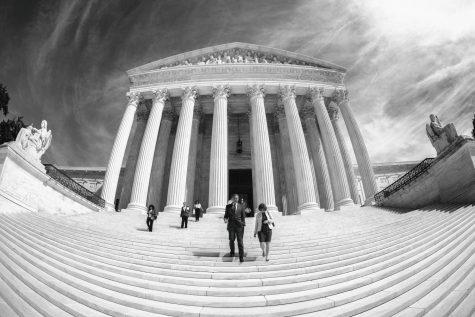The Controversy of RBG’s Replacement, Judge Amy Coney Barrett
On September 25th, 2020, President Donald Trump nominated Judge Amy Coney Barrett to replace Justice Ruth Bader Ginsburg on the Supreme Court, sparking controversy.
Judge Amy Coney Barrett is nominated to the US Supreme Court by President Donald Trump.
September 28, 2020
After Ruth Bader Ginsburg’s death on September 18th, the nation grieved the loss of one of the greatest Justices who ever walked the floors of the Supreme Court. However, the Trump Administration took this as a chance to gain the upper hand in an already bitter race for the 2020 presidency.
Supreme Court Justices are appointed for life, meaning the Justice President Trump appoints can sway the Supreme Court towards the right for the length of their tenure. Before Justice Ginsburg’s death, the political leaning of the Court was fairly equal, with five Republican justices and four Democratic ones. However, with a spot available, the president now has the power to tip the scale of the Supreme Court heavily to the right.

On September 25th, shortly before the rapidly approaching presidential election, Donald Trump nominated Judge Amy Coney Barett for Justice Ginsburg’s seat. This goes directly against the president’s previous statement while President Obama was in a similar situation shortly before the previous presidential election.
In March of 2016, Republican Justice Antonin Scalia died, leaving President Barack Obama with the decision for a replacement. Before he could do so, Senate Majority Leader Mitch McConnel declared any Supreme Court Justice nomination null and void, mandating that the replacement be decided by the following president.
On multiple occasions, President Trump similarly opposed Obama’s decision for a replacement of Justice Scalia, making many claim his recent nomination to be hypocritical.
On Saturday, Mr. Trump announced that he would be appointing Judge Amy Coney Barrett, who, before the nomination, served on the U.S. Court of Appeals for the Seventh Circuit. Many predict she will be as much of a flagship Justice for the right as Justice Ginsburg was for the left.

Due to her religious affiliations and outspoken beliefs regarding abortion rights and the death penalty, Judge Barrett has made herself very popular amongst religious conservatives. During her more junior years with the U.S. Court of Appeals, she wrote an article arguing that any Catholic judges, when approached with a Death penalty case, should recuse themselves as the death penalty would conflict with their religious affiliations.
While this example of Judge Barrett’s religious convictions poses no immediate threat to her validity as a judge, people from the left worry that, given her judicial record, she would uphold cases that challenge Roe v. Wade, possibly declaring abortion unconstitutional. Many organizations have also expressed concerns regarding Judge Barrett’s stance on LGBTQ+ rights, as much evidence implies that the judge opposes marriage equality and transgender rights.
In a tweet yesterday, Democratic Candidate Joe Biden also opposed Donald Trump’s decision to nominate Judge Barrett, saying that “The Senate shouldn’t act until after the American people select their next president and the next Congress.”
Mr. Trump’s nomination of Judge Barrett is a decision that the American People will feel the effects of for decades, and it appears to be a final effort from President Trump to win the votes of the people Judge Barrett represents. The nomination also holds implications for multiple controversial issues such as gay marriage and abortion access.


Arvind • Sep 29, 2020 at 5:18 pm
Nice article Toby!